Energy Sector Photo Contest 2024
Style
USAID’s energy programs help countries build reliable and resilient energy systems that are widely accessible and affordable. We work across all aspects of the energy sector to fuel global prosperity by building critical skills among partners, strengthening institutions, and facilitating investment in technology and infrastructure.
In this year’s Energy Sector Photo Contest, we received 209 photos that represent this work across 27 USAID programs and projects in 26 different countries. These winning photographs tell the story of USAID’s energy programming across a variety of sectors, such as gender, energy access, infrastructure, climate, and power sector reform. Read on to see our overall winners and winners for individual categories, and check out all submissions on Flickr. Congratulations to our winners and to all participants!
1st Place Overall: SURE Senegal

A woman, accompanied by several children, stands next to a solar-powered water pump. Through the Scaling Up Renewable Energy (SURE) program, USAID supports the Government of Senegal’s efforts to increase sustainable access to safe water in rural areas, enhance livelihoods and catalyze private investments to address the water finance gap. Between 2022 and 2023, SURE Senegal awarded four grants totaling $546,455 and provided business support to local water service providers – Aquatech Senegal, FlexEAU S.A., and Société de Gestion des Eaux du Sénégal – to convert diesel and manual water pumping systems to solar to increase service quality and availability of water supply in remote areas.
Transitioning to solar-powered pumps will allow farmers to work year-round, boosting economic growth and easing the burden of daily chores, particularly for women. By the end of 2024, SURE Senegal grants are expected to solarize nearly 90 rural water pumps and finance the management of 17 already solarized sites to improve the continuity of service and access to water for nearly 450,000 inhabitants.
Photo Credit: Ernest Cisse / Tetra Tech
Location: Sintiou Mamadou Siré, Sénégal
2nd Place Overall: Engendering Industries
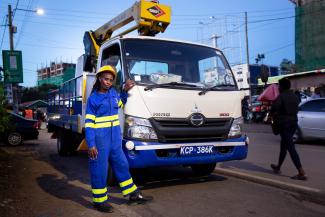
Tannis Omosa, Technical Lead at Kenya Power, leans on a service truck while inspecting street lights in Nairobi’s West Market. Kenya Power has partnered with USAID’s Engendering Industries since 2015. Through their engagement with USAID, Kenya Power realized the importance of installing street lights in markets for women, who make up the majority of street vendors. Lights enhance safety, enabling female market vendors to operate at night and increase their earnings. Kenya Power now works to optimize their street lighting initiatives by tapping women, like Tannis Omosa, to lead their street lighting teams.
Since joining Engendering Industries, the utility has added over 150 women to their staff, increasing the proportion of female employees by almost 10 percent.
Photo Credit: Alec Jacobson / USAID Engendering Industries Program
Location: Nairobi, Kenya
3rd Place Overall: Southern Africa Energy Program (SAEP), a Power Africa initiative
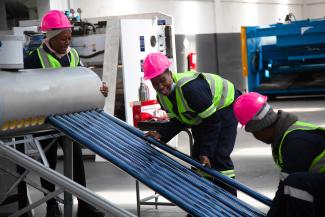
Three learners from the Gert Sibande Technical Vocational Education and Training College, in Mpumalanga, South Africa, learning how to install evacuated tubes into an evacuated tube solar water heater. This formed part of their practical studies under USAID Southern Africa Energy Program (SAEP)’s Renewable Energy Skills Development Programme Phase 1, which started in April 2023 and ended in September 2023.
The skills program is a partnership between SAEP, a Power Africa initiative, and the Energy and Water Sector Education and Training Authority, which delivered training to women electricians and artisans as well as lecturers in Mpumalanga Province to increase their skills and knowledge to work with renewable energy.
Photo Credit: Power Africa
Location: Mpumalaga, South Africa
Energy Access Winner: SURE Sustainable Energy for Ecuador Electromobility and Universal Access Activity
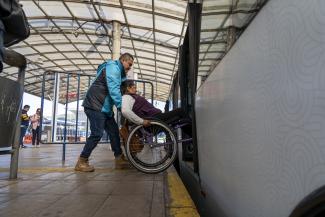
Diana Chasig, a member of the National Federations of and for Persons with Disabilities, participates in a USAID accessibility assessment of the Quito Trole bus stop. Ecuador’s national energy efficiency law bans the use of fossil fuel-based buses after 2030, and the Quito Universal Accessibility Plan requires that persons with disabilities be able to access municipal public transport. USAID is working with Empresa Pública Metropolitana de Transporte de Pasajeros de Quito to advance a more modern, clean, and accessible bus system in Quito.
USAID experts assist Empresa de Transporte to strengthen its electric mobility and accessibility strategy by conducting technical studies to improve its existing infrastructure, and facilitate the procurement and optimization of electric buses and electric trolleybuses and its accompanying infrastructure such as charging stations and handicap access to bus stops. As a result, Quito will have approximately 70 electric buses that will reduce air pollution and displace over 6,000 metric tons of carbon dioxide equivalent (tCO2e) per year. This amounts to taking nearly 1,300 gasoline-powered passenger vehicles off the road each year.
Photo Credit: Veronica Vasconez / Grütter Consulting
Location: Quito, Ecudaor
Energy Infrastructure Winner: Power Central Asia
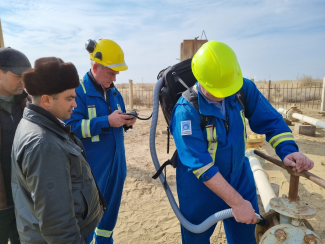
USAID’s Power Central Asia team conducts on-site methane emissions measurements in Turkmenistan. In support of Turkmenistan’s commitment to the Global Methane Pledge, USAID is helping partners in Turkmenistan to identify high-impact, cost-effective opportunities to reduce methane emissions at two prominent locally-managed oil and gas facilities: Turkmengas and Turkmenoil. USAID built local partners’ technical knowledge on methane emissions and mitigation strategies in advance of a field measurement campaign designed to equip the Government of Turkmenistan with a baseline of oil and gas sector methane emissions.
“The collaborative effort involving key stakeholders is fostering lasting change in combating climate change,” noted the international team of expert partners convened by Power Central Asia to collaborate on the field measurement campaign.
This baseline is essential for improving the accuracy of methane emission monitoring and reporting initiatives. Moreover, it provides critical information for policy decisions targeting specific sources of emissions for reduction. By mitigating emissions, Turkmenistan is taking a crucial step toward its methane reduction goals.
Photo Credit: Yegor Zbrodko for USAID
Location: Turkmenistan
Energy Efficiency Winner: Urja Nepal
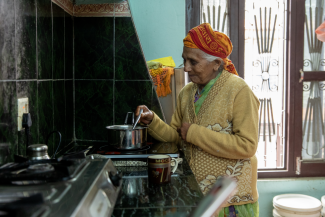
At 72 years young, Hemkala Timalsina brews a cup of her favorite tea on her new induction stove. Thanks to a promotional campaign spearheaded by Women Network for Energy and Environment (WoNEE), a grant recipient under the USAID-funded Urja Nepal program, Hemkala was able to get familiarized quickly with her new appliance. Hemkala appreciates how quickly the induction stove can brew up a cup of chai, saving her time for other activities.
USAID work helps reduce barriers to private investment and open clean energy markets, strengthen governing institutions, reduce air pollution and emissions, and develop resilient and financially viable power systems.
Photo Credit: USAID/ Sushant Maharajan
Location: Vyas Municipality, Tanahun, Gandakhi, Nepal
Energy Security Winner: USAID/Georgia
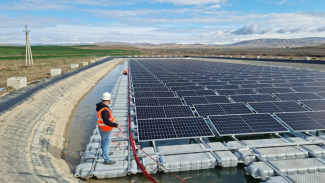
USAID supported Agro Impex Ltd, an agriculture producer in southern Georgia, to install the country's first-ever floating solar power station. USAID co-financed $85,000 of the total project cost of $177,000. The station will slash carbon emissions while generating about 300,000 kWh of electricity each year to irrigate nearby fruit orchards. Because it floats on water, the plant saves valuable agricultural land, reduces water evaporation, and improves solar panel efficiency through natural cooling. This will enable Agro Impex to cut its electricity grid consumption by 38 percent, allowing it to save about $32,400 annually.
With a more efficient business model, Agro Impex hopes to increase production and expand its workforce, which currently includes 150 people from the surrounding area. The company’s managing partner Lasha Jincharadze explained the plant’s environmental impact: “The plant will reduce carbon dioxide emissions by 3,500 tons over a 30-year period. This is equal to planting 50,000 trees or cultivating a forest spanning 50 hectares." In total, USAID is investing $4.5 million in 30 renewable energy pilot projects across Georgia.
Photo Credit: USAID
Location: Lemshveniera, Georgia
Renewable Energy Winner: Lebanon Water Sanitation and Conservation Project
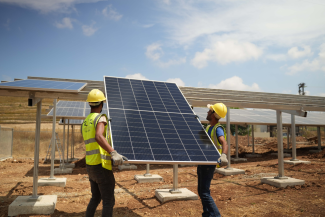
The Lebanon Water Sanitation and Conservation Project installed a solar power system to the water well pump of Mazraat Sinai village in South Lebanon that will allow it to operate better. The solar-powered pump will provide water to more than 1,380 villagers, saving the South Lebanon Water Establishment (SLWE) about $43,000 per year in electricity costs.
Sinai villagers rely on this well pump, which is operated by SLWE, as their main source of water. Because of a shortage in state-provided electricity and due to the absence of back-up generators, which are costly to run, villagers have been deprived of what is considered the essence of life – water. As an added benefit, the solar-powered well pump will help reduce greenhouse gas emissions by about 113,000 kilograms of CO2 equivalent per year. This project is one of three solar power projects installed in three different regions in South Lebanon, and is one of a total of 26 solar power projects that will be installed across different regional water establishments all over Lebanon, benefiting a total of 489,695 people.
“This project not only meets people’s needs, but it also provides us with an alternative source of energy that allows us to save a lot in fuel costs. This means we can run the pump for longer [than on the generator] and provide more hours of water to residents,” Daoud Shomas, Mayor of Zefta, said.
To ensure sustainability, WSC and its partners reminded the community to use this water wisely so that it can be distributed equitably and safeguarded for future generations.
“We should not think that if we install a solar power system on the well, it means we will have endless amounts of water. If we do not raise awareness about water conservation, we would be spending more money, and water would still not reach everyone equitably,” said Mohammed Qobeissi, Mazraat Sinai mayor.
Photo Credit: Charbel Kosseifi / DAI
Location: Mazraat Sinai, Lebanon
Transportation Winner: Power Africa Empowering East and Central Africa Project

Nathan Konde, an employee at Altech Group, a distributor of reliable and affordable clean energy solutions in the Democratic Republic of the Congo (DRC), rides an e-bike. As part of the company’s initiative to reduce carbon emissions, Altech uses electric motorbikes to deliver clean energy products to customers throughout the country.
As awareness of humanity’s impact on the planet’s ecosystems grows, an increasing number of households and organizations are shifting to cleaner and more sustainable energy sources to help mitigate climate change. With technical assistance from Power Africa, Altech developed solar energy kits that provide lighting and power to households in rural areas of DRC where access to electricity remains a challenge.
To help strengthen and expand e-mobility solutions and deliver the benefits of clean energy to communities across Africa, Power Africa supports companies like Altech with technical assistance, market insights, and investment advice.
Photo Credit: Tychique VAKE / Power Africa
Location: Ngaliema, Kinshasa, DRC
Gender Winner: Power Africa Nigeria Power Sector Program
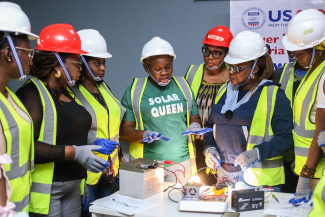
Women gather around a battery and light set up, learning how solar-powered energy works. Historically, women are underrepresented in the power sector’s technical roles, thereby increasing the sector’s gender disparity, and widening the gender pay gap.
The Elevate: Women’s Solar Installation Certification Course in Nigeria is changing this narrative by unlocking access for women to gain hands-on technical training in solar photovoltaic installation, as well as an opportunity to be certified under the Council for the Regulation of Engineering in Nigeria: Nigerian Competency Standards for Clean Energy. Since the course’s inception, about 90 have acquired skills through the course’s hands-on training.
“I was curious about solar but uncertain of a 3-week commitment. But I found the class so intensely satisfying that I knew that I could not afford to miss any class or learning. I have gained increased confidence to talk about solar and effectively install and market solar energy to anyone,” said Ogo Maduewesi, a participant in the course.
Photo Credit: Ashdam Solar / Power Africa
Location: Lagos, Nigeria
Sector Governance and Reform Winner: Energy Secure Philippines
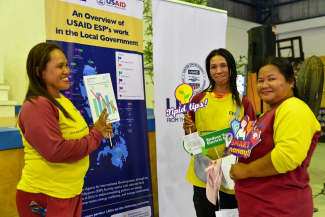
In celebration of the International Women’s Month, members of the Kababaihang Kakaiba ng Mandaluyong (Exceptional and Outstanding Women of Mandaluyong) in the Philippines exchange best practices on how to lower electricity bills at home to earn more savings while protecting the environment.
Jennylyn Villariez, pictured at right, appreciates these USAID-supported workshops that empower them as leaders of their own households. “I hope there will be more workshops like these on Energy Efficiency and Conservation,” she said. “This is very relevant. We learn how to save energy and at the same time we can save on electricity costs. Our savings can be used for other household expenses. We are also helping the government reduce energy consumption.”
USAID, through its Energy Secure Philippines Activity, works with various local government units to uphold the strong influence of women in promoting the efficient use of energy at home and in the community.
Photo Credit: Kurl Marx Mendoza for USAID
Location: Mandaluyong City, Metro Manila



